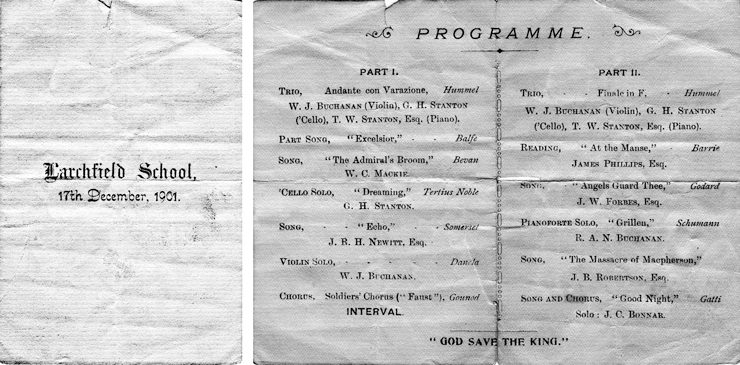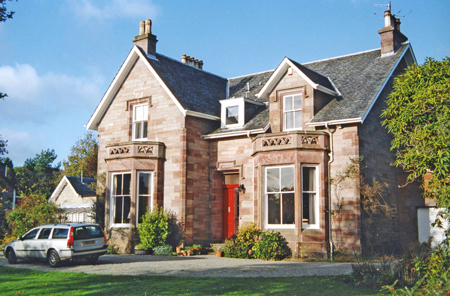THE great entertainer, Jack Buchanan, was born on April 2 1890 in Helensburgh and died of spinal cancer on October 20 1957 in London.
A major UK musical comedy, revue and film star, choreographer, director, producer and manager with a disarming, casual style, Buchanan's career spanned 40 years.
He was the only son of auctioneer Walter John Buchanan JP and his wife Patricia Purves McWatt. They married in Edinburgh on April 27 1889 when he lived in Great Western Road, Glasgow, and she lived in Morningside in the capital.
They set up home at Westwood (later renamed Garthland), 38 West Argyle Street (22 before Helensburgh's streets were renumbered around 1899), and had three children, Jessie, Jack and Catherine. Jack — actually Walter John like his father— was born at Fairy Knowe, 26 Lomond Street, probably where a midwife was based.
Jack grew up at Westwood (pictured below) just along the road from his childhood friend John Logie Baird — who at one time rigged up a telephone between the two houses, until it was insisted that the cable had to be taken down.
In his bedroom there was an alcove at the window, and he used the curtains as if it were a little stage to perform for his family and friends.
Like Baird he was a pupil at Larchfield School, and he played three violin pieces at the school concert on December 17 1901.

He played in amateur dramatics and local music halls before moving to London to work as an understudy and chorus boy.
Rejected for military service at the start of World War One because of poor health, he taught himself to dance, and played a leading role in the touring version of the West End hit musical comedy Tonight's The Night in 1915.
His big break came two years later when he took over from Jack Hulbert in producer Andrew Charlot's revue Bubbly, followed by another Charlot show, A To Z, in 1921.
In the latter Buchanan sang one of his all-time hits, "And Her Mother Came Too", with Ivor Novello's music and a lyric by Dion Titheradge. Also in the cast were Beatrice Lillie and a young Gertrude Lawrence.
After branching out into management with the musical farce Battling Butler at the New Oxford Theatre, Buchanan went to New York with Lillie and Lawrence to appear in Charlot's Revue Of 1924 at the Times Square Theater.
Buchanan was a substantial success on Broadway, and returned in 1926 with another Charlot revue in which he duetted with Lawrence on "A Cup Of Coffee, A Sandwich, And You". The recording reached number 5 in the chart and was his only US hit. Back in London in 1926 he was at his peak in Jerome Kern's Sunny.
 In 1931 he was doing a season at the Alhambra in Glasgow, called "Stand up and Sing", according to the Helensburgh and Gareloch Times of January 14 1931.
In 1931 he was doing a season at the Alhambra in Glasgow, called "Stand up and Sing", according to the Helensburgh and Gareloch Times of January 14 1931.
With Elsie Randolph as his regular leading lady, he appeared in dancing musicals such as That's A Good Girl, Mr Whittington, This'll Make You Whistle, and their last show together in 1943, It's Time To Dance.
He also went back to New York for Wake Up And Dream! with Jessie Matthews, and Between The Devil with Evelyn Laye.
Songs such as "Who", "Goodnight Vienna", "I Think I Can", "There's Always Tomorrow", "Fancy Our Meeting", "Sweet So And So", "Weep No More My Baby", "By Myself" and "I'm In A Dancing Mood", were delivered in a seemingly fragile, "typically English" style.
In his show Stand Up And Sing at the London Hippodrome in 1931, a very young Anna Neagle was discovered by film producer Herbert Wilcox, who started her on the road to a long and distinguished film career by putting her into the Buchanan film Goodnight Vienna.
In 1936 it was reported that Jack was going to start his own film company 'Jack Buchanan Productions', and work was going to start on his first film, at Pinewood studios, later in the year.
Buchanan's own film career proper started in 1917 with the silent Auld Lang Syne — he had previously worked as an extra — and included a series of comedies, light dramas and farces such as Yes, Mr Brown, Brewster's Millions and The Gang's All Here.
His first movie musical was Paris, with Corsican actress/singer Irene Bordoni, and he made several more including Monte Carlo, directed by Ernst Lubitsch, and co-starring Jeanette MacDonald, plus a few celluloid transfers of his hit stage productions.
In 1953, the top UK and US song-and-dance men met in The Band Wagon. Buchanan and Fred Astaire's duet, "I Guess I'll Have To Change My Plan", and their clever version, with Nanette Fabray, of "Triplets" fame, made this one of MGM's most acclaimed musical films, and the pinnacle of Buchanan's career.
- Westwood/Garthland photo by Donald Fullarton. Larchfield concert programme donated to Helensburgh Heritage Trust by Andrew Widdowson, whose late father John was headmaster in the early 1970s.